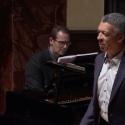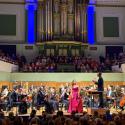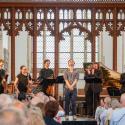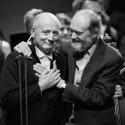The prospect of a new concerto from a largely unknown composer who, it’s safe to say, had never been performed previously in Liverpool may have seemed a little daunting. By the end of the 22-minute world premiere, however, rapturous applause greeted this approachable, tuneful, understated and, above all, gentle work. This was so much the case that it will no doubt be heard again soon.
Soloist Cormac Henry, the principal flute of the Royal Liverpool Philharmonic Orchestra, continued the long-established tradition of commissioning major works which showcase the RLPO's principals. So it was that he premiered the new Concerto for Flute and Orchestra by Viennese composer Kurt Schwertsik. This is Schwertsik’s second flute concerto, the first being Instant Music, composed in 1983. While that was much more a chamber work, his latest offering is a more traditional piece in which all of the composer’s skills as an orchestrator are brought to the fore, ensuring that the solo instrument is never swamped by the mightier forces on hand.
There was much humour in here, too, almost the stuff of Ealing comedy
The composer says he would prefer the work to be called by its subtitle, “Breathing, you invisible poem!”, a quotation from Rilke’s Sonnets to Orpheus. It opened with a languorous, solemnly introspective episode for alto flute. At the outset, it was a conversation between the soloist and the lower strings. This interplay of understatement, peppered with the odd bright interjection, continued as the focus of the soloist’s attentions moved up the scale. But the orchestra, under conductor Vasily Petrenko, was ever-gentle, never moving much beyond the muted tones which became the hallmark of the movement.
The vivace second movement was, again, gentle but with much more interplay between the solo lines and the accompaniment. The composer exploited a massive range of colours from the orchestra, all of which were played to great effect by Petrenko. There was much humour in here, too, almost the stuff of Ealing comedy.
The high point had to be the slow molto tranquillo, alla breve third movement. The cross rhythms combined with the intricate counterpoint made for significant musical interest, though not at the expense of creating an opaque texture which was difficult to work through. It was an all too brief movement which sank into delightful repose. The furious finale felt inspired by a Bach chorale, with particularly prominent interplay between the flute and the brass. The accelerando at the end and the sudden, fortissimo chord that closed the work brought to an end a delightful new addition to the repertoire.
Henry’s virtuoso playing certainly added much to the performance, as did the way in which Petrenko controlled the orchestra. That control was certainly evident in the poised and elegant performance of the opening "Unfinished" Symphony by Schubert, as well as a fast-paced Haffner Symphony and a splendid reading of Richard Strauss’s Der Rosenkavalier suite, during which the waltzes were really allowed to flower.












Add comment